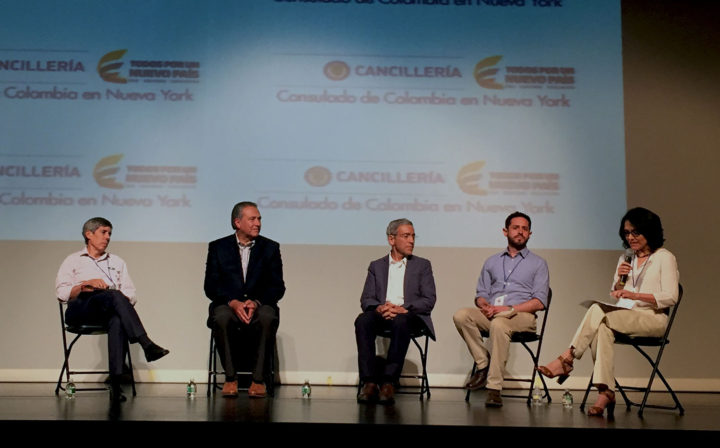Yesterday in New York, in celebration of Colombian Independence Day, the consulate and various local organizations organized a social services fair at LaGuardia Community College in Queens. In light of recent developments in their home country, it was appropriate that the highlight of the event was a panel (Conference Alto Commisionado para la Paz) with Captain Oscar Naranjo, Alan Jara, Jesuit Fransisco de Roux, and Juan Carlos Villamizar addressing last month’s historic peace accord. All agreed that the country was at a crossroads: as Mr Naranjo summarized it, the Colombian people can either give peace a chance and end decades of violent conflict or remain attached to war and resentment.
On June 23, the Havana talks reached a crucial point when the Colombian government and FARC (Revolutionary Armed Forces of Colombia) signed “A Bilateral and Definitive Ceasefire, Cessation of Hostilities, and Laying Aside of Weapons.” (Details of the agreement can be seen at WOLA.) On June 29, the first group of United Nations observers arrived in Colombia to help with the monitoring and verification of the cease-fire. Now the actual peace treaty needs to be signed, possibly within the a few weeks. After that Colombia’s Constitutional Court will decide on the proper procedure for a public vote to approve the peace accords. It will be a Yes or No referendum and could occur within the next 60 days. “If the public says ‘No,’ the process stops and there will be no result,” Humberto de la Calle said in an interview with El Tiempo newspaper.
A recent poll shows 70% support for the Yes, but No proponents may gain support by giving a partial or manipulated view of the agreement. (It is important to remember what happened in the UK with the recent Brexit vote.) The Yes campaign is looking for International support and asking organizations and governments from all over the world to pledge their support. A United Nations expert on conflict and crisis situations, Fabrizio Hochschild, said the intergovernmental organization “100 percent support(s) the peace process”. The UK has been committed to supporting the peace process since official talks began and this year has contributed £4.2m to a UN fund, and a further £1.1m to an EU fund, to prepare and implement a peace deal. In May the European Commission High Representative/Vice-President Federica Mogherini was in Colombia, where she announced new EU support for conflict affected regions, green growth, and land rights together with a series of immediate actions to support Colombia and announced that the EU will provide an overall package of over €575 million to support Colombia’s post-conflict and peace building efforts.
5 million Colombians living outside of the country will be able to participate in the referendum. The Government is working on the logistics with UNHCR, who will help in the six foreign countries with the largest Colombian population: Canada, Venezuela, Ecuador, the United States, Spain, and Australia.










